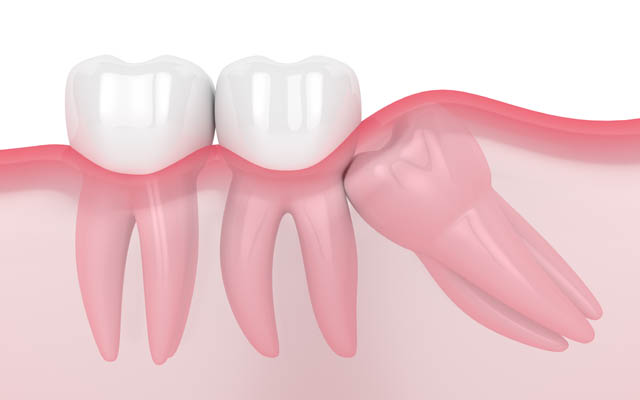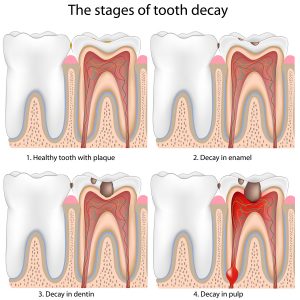
Tips for Preventing Common Dental Problems
The philosophy of our dental office is that Preventive Dentistry is as essential as supplying dental treatments. After all, “an ounce of prevention is worth

Wisdom teeth – or a wisdom tooth – are also known as any one of the third or fourth molars found in the permanent dentition (adult teeth). They are the last and most posterior teeth found in the dental arch.
Wisdom teeth usually end up being removed or extracted for the oral health and well-being of the patient.
Preventing complications before they happen is why we recommend removing wisdom teeth when you’re in your mid-teens.
By removing or extracting impacted wisdom teeth earlier than later, you prevent pain or more severe damage to your oral health over time.
Even if no pain or complications exist, the mid-teens are the best years to remove wisdom teeth as roots haven’t completely formed, making them easier to extract.
Even if there’s no pain or obvious complication felt at the time, the mid-teens are the best years to remove wisdom teeth because the roots haven’t completely formed, making the wisdom teeth easier to extract.
In most cases, complications like infections or overcrowding tell you that your wisdom teeth are coming in. And by then, you’re into your mid-twenties, even older.
A select few people—about a third of people, have all four—two up top, two down – come in without any problem and don’t need them removed.
Get wise about wisdom teeth. Call 905-791-3867 to book an appointment.
We welcome new patients—teens and adults who need their wisdom teeth removed or extracted.
Wisdom teeth are the set of four “third molars” that tend to appear in the late teenage years and reach full development by the early – to mid-twenties.
It’s believed that wisdom teeth get their name due to their late arrival – when people are a little older and (hopefully) wiser. Interestingly, they are called “love teeth” in Korea, referring to the age-associated with the pain of first love lost.
But removing impacted wisdom teeth at the appropriate time can alleviate unnecessary pain or discomfort later on. The end of adolescence is often ideal since the roots are not yet completely formed, making the teeth easier to remove.
Removing wisdom teeth may be necessary for a few reasons, either because they are already causing a problem or become a problem later on.
Fact: About a third of people never develop any wisdom teeth at all.
Your teeth and surrounding area will be fully numbed with a local anesthetic, the same kind you’d get before having a cavity filled.
If you’re feeling anxious about having your wisdom teeth removed, we can give you nitrous oxide an oral sedative to help you relax during the procedure.
The longest part of wisdom teeth extraction is the healing afterwards. Usually, the removal itself only takes roughly 45 minutes. Following the removal of your wisdom teeth, you’ll notice:
Swelling
The swelling is good. It’s a sign the healing process is happening as it should.
How much and how long the swelling happens is different for each person. It can range from one day to a week, with three days being the average.
Using an ice pack will help control it and soreness too.
Bleeding
Bleeding is unavoidable. If you got stitches, usually for a wisdom tooth that hasn’t come up through the gums and required an incision (cut) to get at the tooth, the stitches will help minimize bleeding.
We’ll give you gauze to protect the area and aid healing. As you put in fresh gauze, you’ll notice the bleeding lessening and finally stopping.
Pain
You’ll feel some soreness or discomfort after removal.
We’ll advise you to take over-the-counter painkillers (e.g. Tylenol, Advil) to alleviate the soreness.
Antibiotics may also be prescribed to combat infection caused by impacted wisdom teeth, or to prevent further infection.
Eating and drinking
A liquid or soft food diet should be followed after removal to prevent any food particles from getting into the site. Also, avoid alcohol and smoking as they slow healing.
After removal, a liquid or soft food diet should be followed to prevent food particles from entering the site. Also, alcohol and smoking should be avoided as they slow healing.
Wisdom teeth are evolutionary ‘third molars.’ They’re a holdover from our ancient ancestors whose diet was tougher (e.g. leaves, nuts and meat foraged and hunted as opposed to cultivated and cooked carefully) and that required greater chewing power.
Over the last several centuries, various cultures have dubbed wisdom teeth because they come in when you’re getting older—in your teens and twenties—and (hopefully) getting wiser.
Read on to learn more about wisdom tooth extraction and aftercare.
Is it time for a wisdom tooth extraction?
Removing wisdom teeth, including more than a few impacted ones, is a big part of what we do here.
If you live near or in Brampton, and want to know more about wisdom teeth, call us at 905-791-3867 or book an appointment online. You’ll be glad you did!
Fill out the form below to inquire about our dental services in Brampton, ON or to request an appointment.

The philosophy of our dental office is that Preventive Dentistry is as essential as supplying dental treatments. After all, “an ounce of prevention is worth

Most of us have a pretty good idea of the kinds of foods to avoid when it comes to maintaining dental health, and avoiding tooth

Gums play an essential role in maintaining the health of your mouth. According to the Canadian Dental Association, 7 out of 10 Canadians will experience

The Cavity Process The above images show the cross section of a molar tooth at various stages of the tooth decay process. You can see
Dr. F. Keshavarz Dentistry
40 Finchgate Blvd Suite 121
Brampton, ON L6T 3J1
(Located in the: Bestgate Professional Centre)
Phone: 905-791-3867
Privacy Policy | Terms of Service | Website designed and powered by: Say So Marketing